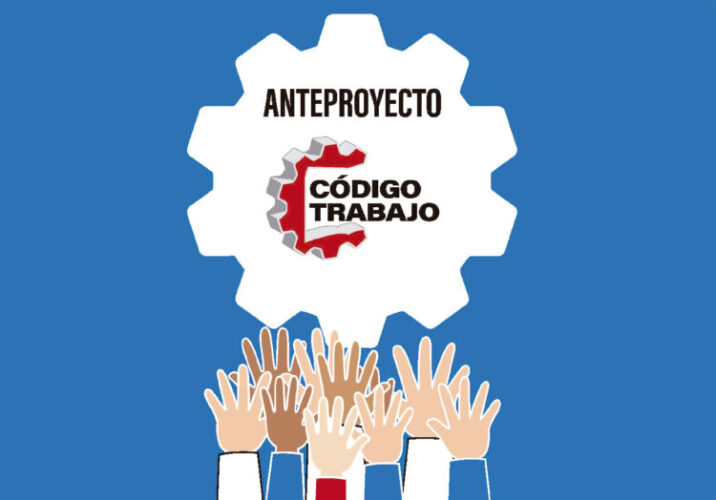Union Contributions to the Consultation on the Draft Labor Code
- Written by Francisco Rodríguez Cruz and Joel García León
- Published in Cuba
- Hits: 473
 Just one week before the consultation on the Draft Labor Code begins (September 8 to November 30), we offer a glimpse into the preparation of unions and provinces, as well as the expectations, established conditions, and controversial topics that may raise questions and prompt worker interventions.
Just one week before the consultation on the Draft Labor Code begins (September 8 to November 30), we offer a glimpse into the preparation of unions and provinces, as well as the expectations, established conditions, and controversial topics that may raise questions and prompt worker interventions.
Katia Labrada Vidal, Secretary General of the National Union of Transport and Port Workers, was asked: How does the Union plan to ensure that the consultation includes the broad non-state sector involved in transportation?
“This segment represents 43% of the total workers in the sector, yet only 36% are unionized. Together with the Ministry of Labor and Social Security, we’ve established actions that define responsibilities. Each Superior Business Management Organization (OSDE) will issue instructions to companies and basic business units (UEB). Specifically, the companies Ómnibus Nacionales and Taxis Cuba will ensure the process reaches those with leased vehicles. To support this, we’re coordinating training seminars for grassroots union leaders, extraterritorial bureaus, and workplaces.
“In the first half of September, a virtual training will be held with participation from the State Traffic Unit, which, as the governing body for non-state labor, will coordinate with administrative leadership and provincial transport delegations, alongside the union, to ensure organization and participation of economic actors in the process. We’ll be monitoring progress weekly.”
Exploring All Possibilities
From the National Union of Agricultural, Forestry, and Tobacco Workers, its leader William Licourt González responded: How might the diversity of management and ownership forms influence the consultation process?
“Regardless of the management forms in our sector, we benefit from strong relationships among them. This consultation process requires significant integration to ensure everyone’s involvement. First, we rely on technical support from competent areas within the business system—OSDEs, companies, UEBs, and collectives. Second, we integrate companies with the cooperative sector, which is part of the productive system. Therefore, cooperative boards must be prepared and participate in worker and cooperative assemblies. Third, we coordinate with budgeted areas of the organization, provincial and municipal delegations, and affiliated entities. All of this will be organized under union leadership, with support from the National Association of Small Farmers (ANAP) and other associations.”
Labor hiring issues are controversial in agriculture. What are the expectations regarding the future Labor Code?
“Legal norms have recently been approved that support hiring and the inclusion of actors involved in agricultural production, whether temporarily or permanently. The newly approved decree covering social security for all participants is a guarantee for workers. The consultation process should expand awareness among those connected to the sector so they understand these opportunities and can legalize their employment status.”
Educators Also Respond
Martha Cano Pérez, a member of the Secretariat of the National Union of Education, Science, and Sports, commented on: What are the most frequent labor conflicts in the education sector that might require adjustments in the new Labor Code?
“In education, the most common issues are physical mistreatment, workplace harassment, and violations of workplace regulations. These areas don’t see major changes in the new Code, so no adjustments are necessary.”
Regarding differences and similarities in how the Draft will be consulted across various types of education, she stated that there are no major differences because each workplace and entity has a Collective Labor Agreement (CCT) negotiated between the employer and the union. No two CCTs are alike.
Holguín Is Ready to Begin
Idalmis Serrano Gómez, Secretary General of the Provincial Committee of the Cuban Workers’ Central (CTC) in Holguín, detailed the specific preparation and participation expected from union leaders in the province and its municipalities to carry out the consultation:
“We’ve been working on the political assurance of the Draft consultation process with workers, according to the approved schedule and CTC guidelines.
“On June 18, the provincial seminar was held, initiating the training of union officials. From then until June 30, training was conducted at the municipal level and with grassroots structures, allowing us to train 947 union and administrative officials responsible for organizing the process—an essential step for its success.
“Once the tabloids were received on August 31, conditions were set for all 14 municipalities to have the material by September 1, ensuring the preparation of grassroots union leaders and workers.
“In the province, 2,790 meetings will be held, and there’s no doubt this will be a major exercise in democracy, as our workers will contribute to improving the new Labor Code through their participation.”
Holguín is a territory where the industrial sector has been very significant. What solutions might the Code offer to help resolve current problems in its most important factories?
“The Code we’ll be consulting, from its very foundations, could offer solutions to the main problems in the industry, recognizing new forms of employment and entrepreneurship. These, when linked with industry, could ensure increased physical production and greater efficiency in services to the public. Teleworking and multiple employment help stabilize the qualified workforce, which contributes to reducing labor migration.” (Source : Trabajadores)
